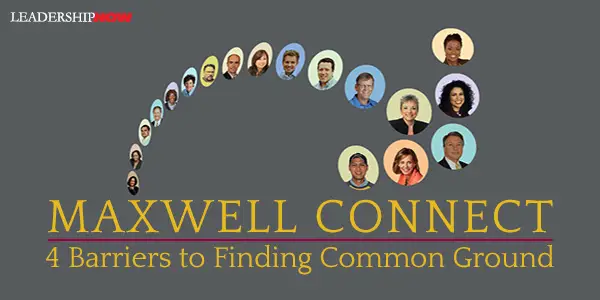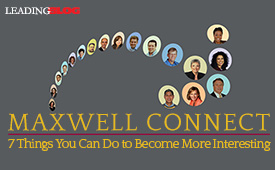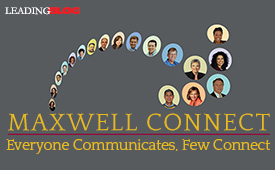Maxwell Connect: 4 Barriers to Finding Common Ground

THE first rule of connecting is to find common ground. Again, this requires an other-focus. In Everyone Communicates, Few Connect, John Maxwell writes, “It is difficult to find common ground with others when the only person you are focused on is yourself!” We can’t find common ground if we are trying to make other people into a version of ourselves.
Each of us sees the world from our own unique perspective. Terry Felber, author of Am I Making Myself Clear? wrote, “If you can learn to pinpoint how those around you experience the world, and really try to experience the same world they do, you’ll be amazed at how effective your communication will become.” The secret to finding common ground is the willingness to see things from others’ point of view.
wrote, “If you can learn to pinpoint how those around you experience the world, and really try to experience the same world they do, you’ll be amazed at how effective your communication will become.” The secret to finding common ground is the willingness to see things from others’ point of view.
There are many reasons people neglect to find common ground, Maxwell says, but here are the top four:
- Assumption: “I already know what others know, feel, and want.” “All miscommunications are a result of differing assumptions,” says Jerry Ballard. “We need to be like a good tailor. Every time he sees a client, he takes new measurements. He never assumes people are the same as the last time he saw them.” This is even true of those close to you. When you make assumptions about people, “you stop paying attention to people and miss clues that would otherwise help you to find and reach common ground with them.”
- Arrogance: “I don’t need to know what others know, feel, or want.” Supreme Court Justice Louis D. Brandeis observed, “Nine-tenths of the serious controversies that arise in life result from misunderstanding, from one man not knowing the facts which to the other man seem important, or otherwise failing to appreciate his point of view.” Our arrogance builds a barrier between us and others when we hold to our way of thinking to be the only right way.”
- Indifference: “I don’t care to know what others know, feel, or want.” Indifference is really just another form of selfishness. “Communicators who are indifferent are focused on themselves and their own comfort instead of extending themselves and finding the best way to relate to others.” ”
- Control: “I don’t want others to know what I know, feel, or think.” Maxwell says that finding common ground is a two-way street. Good leaders “inform people, make them a part of what is going on, and include them in decision-making whenever possible. You cannot establish common ground if you refuse to let anyone know who you are or what you believe.”
Taking down these barriers is a matter of choice. It means making yourself available, listening to others, asking questions, being open, being adaptable to people and situations, and most importantly, being humble. “I will think of myself less so I can think of others more.” Civil rights activist Cornel West says, “Humility means two things. One, a capacity for self-criticism…. The second feature is allowing others to shine, affirming others, empowering and enabling others. Those who lack humility are dogmatic and egotistical. That masks a deep sense of insecurity. They feel the success of others is at the expense of their own fame and glory.”
If we want to find common ground, Maxwell recommends we step back and ask:
- Do I feel what you feel BEFORE asking, “Do you feel what I feel?”
- Do I see what you see BEFORE asking “Do you see what I see?”
- Do I know what you know BEFORE asking, “Do you know what I know?”
- Do I know what you want BEFORE asking, “Do you know what I want?”
* * *

Follow us on
Instagram and
Twitter for additional leadership and personal development ideas.
* * *




Posted by Michael McKinney at 07:34 AM
Permalink
| Comments (0)
| TrackBacks (2) | This post is about Communication










